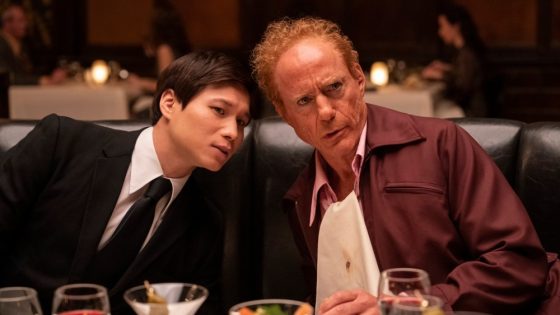The first sound you hear in every episode of “The Sympathizer” is the whir of a projector. Like the Pulitzer Prize-winning novel on which it’s based, the seven-part HBO series is structured as a prisoner’s confession, written under duress in a Vietnamese reeducation camp in the years after the war. Except unlike the book, published by author and executive producer Viet Thanh Nguyen in 2015, this confession isn’t read — it’s seen, a shift that propels both the innovations and the errors of the otherwise faithful adaptation. Nguyen’s story already contains a commentary on Hollywood representations of the conflict through a sojourn on the set of a film that strongly resembles “Apocalypse Now.” As reconceived by showrunners Don McKellar and the revered South Korean auteur Park Chan-Wook, “The Sympathizer” moves these metatextual matters to the center of its dense, ambitious, tonally varied project.
Park previously dabbled in English-language television with an underrated adaptation of “The Little Drummer Girl,” another story that hinges on how espionage erodes the line between the spy’s true self and their assumed identity. The protagonist of “The Sympathizer” is a nameless figure known only as the Captain (Hoa Xuande), a man who lives at the nexus of several different dualities. He’s mixed race, the son of a Vietnamese woman and a French colonizer whose identity remains unknown. He’s a secret agent, an ardent communist embedded with American allies in the country’s south. And as a result, he’s quite literally caught between his two closest childhood friends: Bon (Fred Nguyen Khan), who hates the Viet Cong for killing his family, and Man (Duy Nguyen), who’s secretly the Captain’s handler in their soon-to-be-victorious liberation movement.
Over his years undercover, these competing instincts have turned the Captain into something of an ideal narrator, a truly neutral party who absorbs and reflects the worldviews of those around him. “You’re not half of anything — you’re twice of everything,” his mother tells him. Much like Florence Pugh’s Charlie in “The Little Drummer Girl,” the Captain is not a hollow vessel bereft of real beliefs. Rather, he’s a man burdened by too many beliefs. Yet despite this multiplicity, the nature of its new medium means that an inherently ambiguous character must be fixed to a specific performance, going from passive observer to active presence. This challenge is made steeper only by a distracting pair of colored contacts that stand in for the Captain’s European ancestry, though Xuande works dutifully to bridge the role’s competing briefs. If the actor doesn’t quite manage to sell the Captain as a smooth operator and a sentimentalist, an ideologue and an empath, it may be because the part remains a distinctly literary creation.
But while it pins down the Captain, “The Sympathizer” takes an entirely different tack with his American counterparts. The show was initially announced with a single cast member: Robert Downey Jr., now a freshly anointed Oscar winner. Movie stars helming miniseries is now standard procedure, though “The Sympathizer” is meant to de-center dashing white guys like Downey in its account of what the title card points out is known as the American War overseas. On the other hand, the structural bias of the U.S. film industry has produced a dearth of Vietnamese movie stars. “The Sympathizer” posits a bold solution to both of these problems. Downey plays not one smug imperialist, but a suite of them: the Captain’s CIA mentor in the dark art of information-gathering; the Orientalist professor who taught him as a college student in Los Angeles; the Congressman who cultivates South Vietnamese refugees in Southern California as a political base; and the maverick director who employs the Captain as a consultant on his blockbuster production.
This approach both deploys and diffuses Downey’s star power. Individually, some of these performances betray the showboating instincts of an actor looking to prove his versatility and verve after a decade in a metal suit. (The CIA. man matches the Captain’s contacts and raises him a layer of caked-on prosthetics; the professor gets a potbelly and a host of metrosexual mannerisms.) Collectively, though, they become a self-effacing exercise in embodying an idea rather than an individual — the same way American media, including the movie-within-a-show, presents most people of marginalized ethnicity or nationality. The director, in particular, allows Downey to revisit the parodic ground of “Tropic Thunder” without the attempted racial satire.
If Downey’s deployment treats the American establishment as a monolith, “The Sympathizer” outlines internal factions of the Vietnamese and broader immigrant experience in attentive detail. After the fall of Saigon, including a gripping runway sequence directed by Park with virtuosic intensity, the action moves to 1970s Los Angeles, where the Captain reports on the nascent, likely futile plan for a deposed General (Toan Le) to take back their country while posing as his aide-de-camp. (However surreal “The Sympathizer” can be, the locations team grounds its events in rundown bungalow courts and midcentury dingbats, creating a time capsule of a since-transformed Southland.) In his own time, the Captain strikes up an affair with Sofia Mori (Sandra Oh), a nisei woman who identifies as American first and Japanese second.
“The Sympathizer” draws a contrast between the General’s longing for a lost homeland and Mori’s total assimilation while exploring the spectrum between these two poles. Embracing America means different things to different people. To the Major (Phanxinê), another anti-Communist, it means starting a side hustle in expired candy, buying into the belief the only color that matters in this country is green. To Sonny (Alan Trong), a journalist, it means embracing the dissent enabled by democracy, challenging figures like the General from the left without adopting the dogma of communism. To Lana (Vy Le), the General’s daughter, it means pursuing stardom as a singer. The Captain may suffer from his transposition to a new format, but the camera’s all-seeing eye also allows these peripheral figures greater depth.
Still, the dominant presence across the first three episodes is Park, whose flair for balletic violence and perverse comedy is perfectly suited to the material at hand. (Fernando Meirelles helms the fourth episode, which centers on the film shoot, while Marc Munden directs the season’s home stretch.) Images like a teenage Captain using a tube of raw squid to pleasure himself are lifted from the text, but could’ve come from any previous Park feature; a scene where an angry mob jostles an outhouse with the Captain and General trapped inside enhance the show’s sense of wry detachment, in keeping with the Captain’s ability to see the absurdity of his situation from his eventual captivity.
“The Sympathizer” is loyal to Nguyen’s ideas as well as his plot. Characters make speeches about the resonance of America (“If you fully commit to this land, you become fully American. But if you don’t, you’re just a wandering ghost”) and the limits of pacifist art (“As long as we can keep them within the nebulous bounds of humanism but with no actual political ideology, they’re completely harmless”). In its calculated chaos, however, “The Sympathizer” conveys the feeling of Nguyen’s mad and maddening world rather than simply reciting the author’s intended takeaways. The show also embeds and anticipates its own critique. “From an American perspective,” a character says of the director’s magnum opus, “it’s pretty progressive.” As the Captain knows, it’s impossible to encompass all the contradictions of a nation at war with itself, and to decide on one angle is to preclude many others. “The Sympathizer” is ostentatious enough in its own choices to stress that every story is the result of someone’s discretion — and no one’s account is ever definitive.
The first episode of “The Sympathizer” premieres on HBO and Max on April 14 at 9 p.m. ET, with remaining episodes airing weekly on Sundays.
Source Agencies



